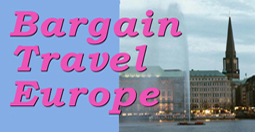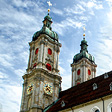SWISS COVERED BRIDGES
Wooden Bridges of Switzerland
 There’s something romantic about a covered bridge, and certainly photogenic. There was a best seller book about the romance of photographing wooden bridges and a movie. The wooden covered bridge may not have originated in Switzerland, but the climate and the rivers along ancient trade routes seemed to make them indigenous. The box-like wooden covering kept the bridge passable in snowy winters, and the Alpine penchant for decoration of wooden structures made them especially beautiful. Some of the best known remaining covered bridges in Switzerland are for foot traffic only, while a few are left for driving, but since they were originally designed mostly for horse carts, the oldest of wooden bridges usually only have enough breadth for one vehicle at a time. .
There’s something romantic about a covered bridge, and certainly photogenic. There was a best seller book about the romance of photographing wooden bridges and a movie. The wooden covered bridge may not have originated in Switzerland, but the climate and the rivers along ancient trade routes seemed to make them indigenous. The box-like wooden covering kept the bridge passable in snowy winters, and the Alpine penchant for decoration of wooden structures made them especially beautiful. Some of the best known remaining covered bridges in Switzerland are for foot traffic only, while a few are left for driving, but since they were originally designed mostly for horse carts, the oldest of wooden bridges usually only have enough breadth for one vehicle at a time. .
 The most famous and photographed of covered bridges in Switzerland is the symbol of Lucerne. The Chapel Bridge (Kapellbrücke), which traverses the Reuss River where it empties from Lake Lucerne past the old city, is distinctive for its stone tower in the middle. The very photogenic bridge with the reflections on the water, colorful flowers and Mt Pilatus in the background has been featured on to many calendars to count. It is most famous for its paintings, which dated back to the 1600s, but had to be recreated after a fire destroyed the bridge in 1993. Thirty of the original paintings were restored.
The most famous and photographed of covered bridges in Switzerland is the symbol of Lucerne. The Chapel Bridge (Kapellbrücke), which traverses the Reuss River where it empties from Lake Lucerne past the old city, is distinctive for its stone tower in the middle. The very photogenic bridge with the reflections on the water, colorful flowers and Mt Pilatus in the background has been featured on to many calendars to count. It is most famous for its paintings, which dated back to the 1600s, but had to be recreated after a fire destroyed the bridge in 1993. Thirty of the original paintings were restored.
 Not quite so familiar as the Chapel Bridge is its nearby cousin, the Spreuer Bridge or Mill Bridge (Spreuerbrücke/Mühlenbrücke), just a short distance downstream. The bridge gets its name from the Spreu, the wheat chaff tossed from it into the waters from the Mill Place (Mühlenplatz) where the mills wheels could turn in the river waters. The bridge makes an angular turn from the shore which made this task convenient and allowed because the discard would flow down the river and not clog the wooded slat water flow system of the Reuss. The bridge was built in 1408, but replaced after a flood in 1566.
Not quite so familiar as the Chapel Bridge is its nearby cousin, the Spreuer Bridge or Mill Bridge (Spreuerbrücke/Mühlenbrücke), just a short distance downstream. The bridge gets its name from the Spreu, the wheat chaff tossed from it into the waters from the Mill Place (Mühlenplatz) where the mills wheels could turn in the river waters. The bridge makes an angular turn from the shore which made this task convenient and allowed because the discard would flow down the river and not clog the wooded slat water flow system of the Reuss. The bridge was built in 1408, but replaced after a flood in 1566.
 Another very photogenic covered bridge in a city is the Bern Bridge in Fribourg. It gets its name from being on the way to Bern, crossing the Aare River in the original old town section, and situated below the much higher and longer modern street bridge which replaced its purpose. It’s a car bridge with one lane, dating from the 1400s, but reconstructed in the 1600s with Baroque decoration. If you don’t have a car in Fribourg, the funicular system from the upper city or the municipal bus from the rail station will get you there.
Another very photogenic covered bridge in a city is the Bern Bridge in Fribourg. It gets its name from being on the way to Bern, crossing the Aare River in the original old town section, and situated below the much higher and longer modern street bridge which replaced its purpose. It’s a car bridge with one lane, dating from the 1400s, but reconstructed in the 1600s with Baroque decoration. If you don’t have a car in Fribourg, the funicular system from the upper city or the municipal bus from the rail station will get you there.
Auguetbrücke also crosses the Aare River near Bern, between Muri bei Bern and Belp. The bridge which dates from 1835 used to serve as a main road crossing between Bern and Thun at Hunzigenau, but in 1974 it was moved to Auguet and reopened as a foot bridge.
Rhine Bridges
 The Holzbrücke Bad Säckingen is a road bridge over the Rhine River connecting the German city of Bad Säckingen in Germany with the village of Stein in Switzerland. This covered bridge at 668 feet (203 meters), crossing the Upper Rhine (Hochrhein) is the longest wooden enclosed bridge in Europe. Another long wooden bridge is the Rhine Bridge at Vaduz (Rheinbrücke Vaduz – Sevelen) crosses borders on the Rhine River between Switzerland and Lichtenstein. Built later than the older foot bridges in 1901 and intended for car traffic is 443 feet (135 meters). The bridge was closed to motor traffic in 1975 and is now a foot and bicycle bridge.
The Holzbrücke Bad Säckingen is a road bridge over the Rhine River connecting the German city of Bad Säckingen in Germany with the village of Stein in Switzerland. This covered bridge at 668 feet (203 meters), crossing the Upper Rhine (Hochrhein) is the longest wooden enclosed bridge in Europe. Another long wooden bridge is the Rhine Bridge at Vaduz (Rheinbrücke Vaduz – Sevelen) crosses borders on the Rhine River between Switzerland and Lichtenstein. Built later than the older foot bridges in 1901 and intended for car traffic is 443 feet (135 meters). The bridge was closed to motor traffic in 1975 and is now a foot and bicycle bridge.
 Wooden covered bridges still in everyday use for cars lie along the Rhine between Eastern Switzerland and Vorarlberg, Austria between Dornbirn and Rheineck near the Altenrhein airport, in the flat countryside across the Dornbirner Ache in Austria. Not as decorated as the ancient wooden foot bridges, they still hold a photographic charm and a flow of rush hour traffic, if crossing a single lane bridge can be considered a rush. © Bargain
Travel Europe
Wooden covered bridges still in everyday use for cars lie along the Rhine between Eastern Switzerland and Vorarlberg, Austria between Dornbirn and Rheineck near the Altenrhein airport, in the flat countryside across the Dornbirner Ache in Austria. Not as decorated as the ancient wooden foot bridges, they still hold a photographic charm and a flow of rush hour traffic, if crossing a single lane bridge can be considered a rush. © Bargain
Travel Europe
Find best hotel and travel deals for St. Gallen on Tripadvisor
These articles are copyrighted
and the sole property of Bargain Travel Europe and WLPV, LLC. and
may not be copied or reprinted without permission.
SEE
ALSO:
RAPPERSWIL WOODEN BRIDGE ON LAKE ZURICH
HOFKELLEREI
LIECHTENSTEIN WINERY

